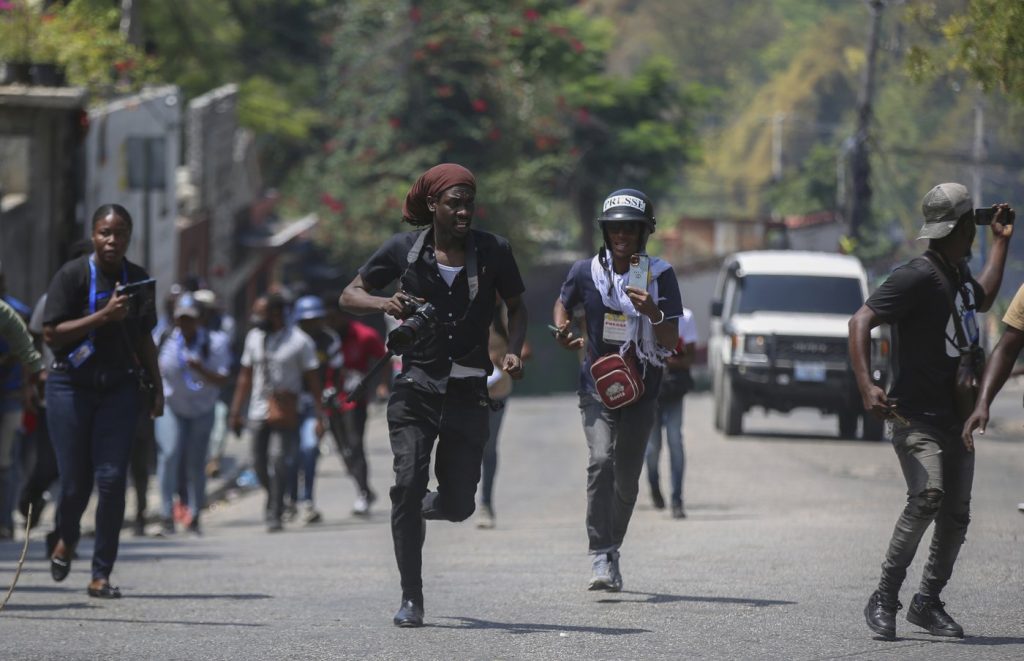In Port-au-Prince, Haiti, journalist Jean-Jacques Asperges, 58, once enjoyed returning home after a day at a radio station despite the risks of operating in one of the world’s most perilous environments for reporters. However, gang violence has forced Asperges and his family to flee their home twice, leaving them to sleep on the floor of a filthy, overcrowded makeshift shelter alongside thousands of other displaced Haitians. “Bullets fall here all the time,” he noted, reflecting the unpredictable violence that permeates daily life.
Having lost all his work equipment, Asperges now relies solely on his phone for journalism. Despite the dangers, he and many other reporters persevere in documenting the deteriorating conditions in Haiti’s capital, where roughly 85% is controlled by dangerous gangs. In March, armed gangs attacked at least three media outlets, robbing them of equipment and delivering a clear message: journalists must operate with the gangs' permission.
The violence escalated dramatically on Christmas Eve, when gangs opened fire on journalists covering a failed hospital reopening that the gangs had not sanctioned. This brutal incident resulted in the deaths of two journalists and injuries to at least seven others, including Asperges himself, who was shot in the stomach. This event was described as one of the most severe assaults on the press in Haiti's recent history.
Max Chauvet, director of operations at Le Nouvelliste, Haiti’s oldest independent newspaper, highlighted the pervasive threat facing journalists in the country. A once essential symbol of safety, wearing a bulletproof vest marked “PRESS” is now considered dangerous, as it draws unwanted attention from both gangs and police. During a recent protest, Jephte Bazil, a videographer, was stopped and threatened at gunpoint by masked men who interrogated him about his motives for being there.
Amid rising mistrust of the media, local journalists face accusations of collaboration with gangs. The Online Media Collective in Haiti has advised reporters to avoid covering incidents involving armed groups, yet many disregard these warnings as they strive to report the truth. Journalists now travel in groups and take precautions, but their access to certain neighborhoods has diminished due to persistent violence.
The gang warfare has had dire consequences for media organizations. Several have closed, laid off staff, or transitioned to online-only formats, such as Le Nouvelliste, which was forced to cease print publication after its offices were attacked last year. On March 13, Haiti's prime minister condemned the attacks on radio and television stations, pledging to protect media institutions, yet the situation for journalists continues to worsen.
Tragically, since 2000, at least 21 journalists have been reported killed in Haiti, with 2022 recognized as the deadliest year for journalism in the nation, claiming nine lives. In 2023, one journalist was reported killed, and two more in early 2024. As violence against media personnel persists, some journalists are opting to flee the country, while others remain to face the ongoing threats in hopes of uncovering the truth.
Haiti ranks first globally for the likelihood of journalist murders going unpunished, according to a 2024 report by the Committee to Protect Journalists. Since 2019, seven killings remain unsolved, including the notorious case of Garry Tesse, a radio host who was murdered amid allegations against powerful figures within the justice system. With attacks on press freedom escalating, the future remains bleak for journalists in Haiti.










